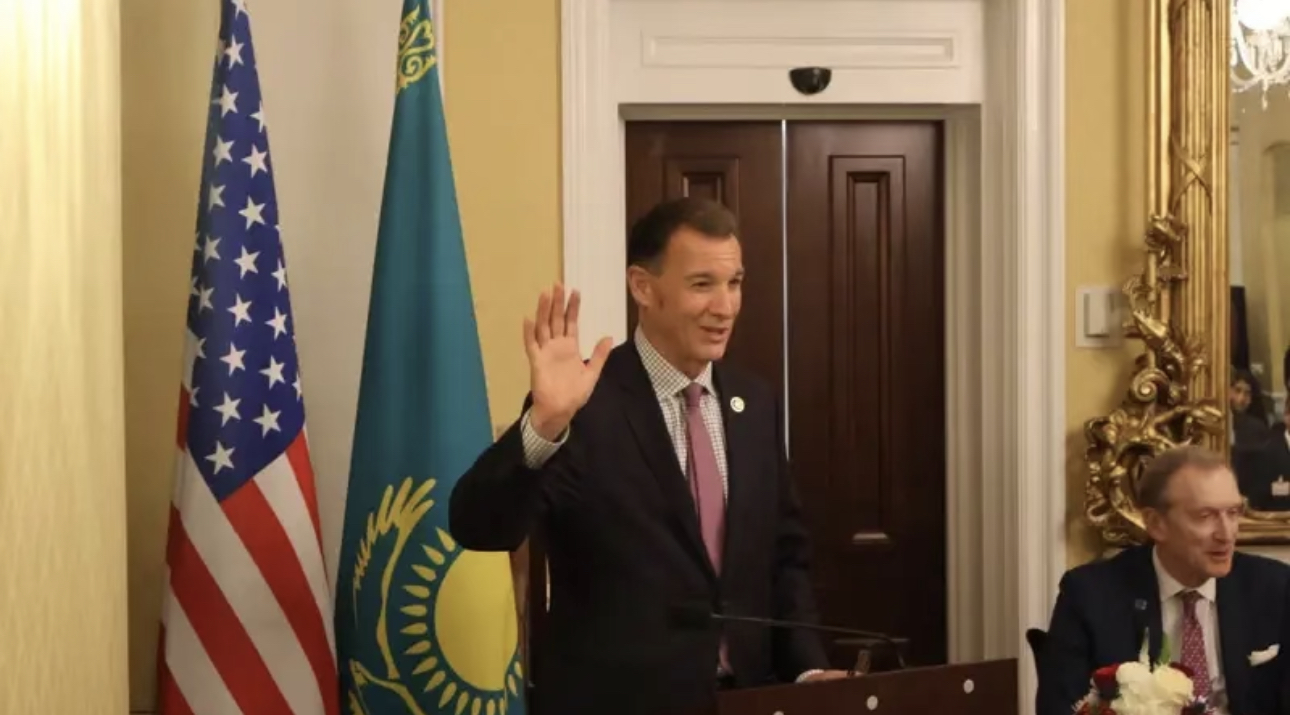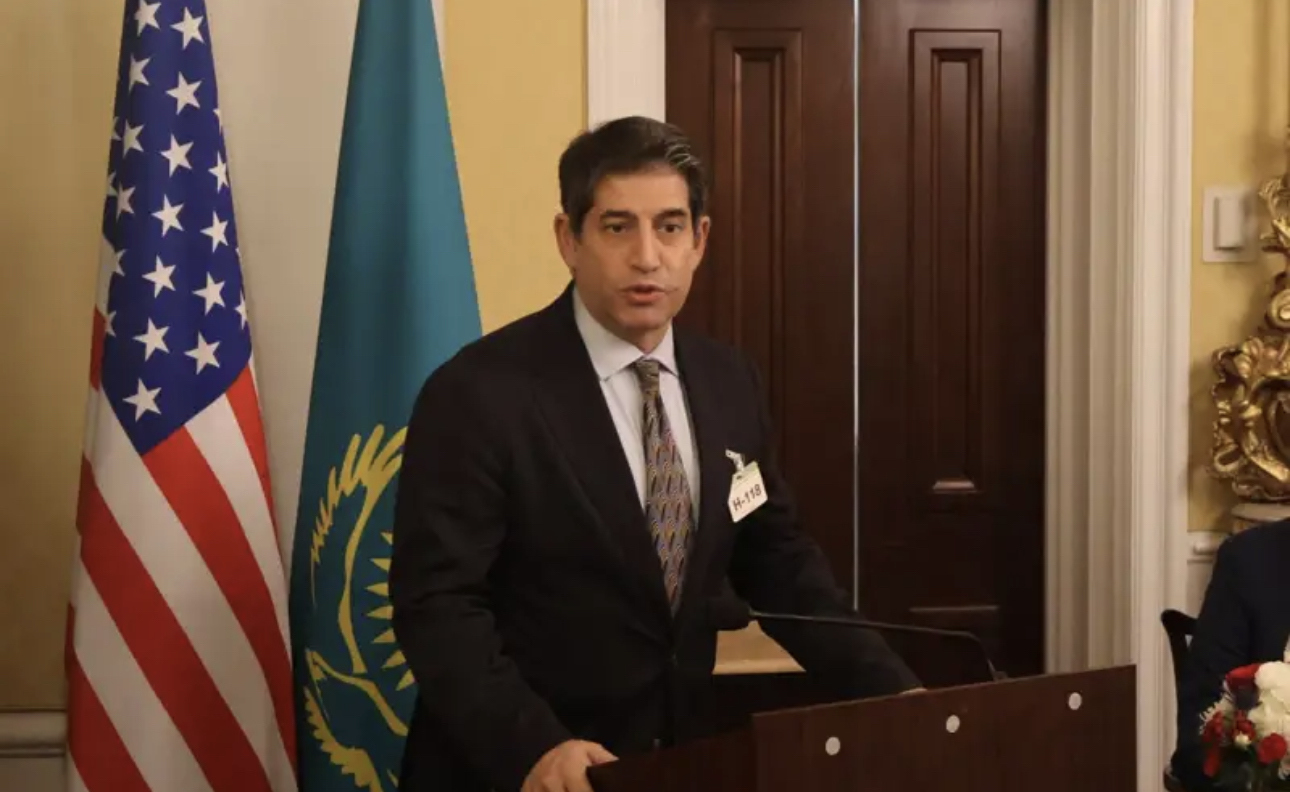ASTANA – The U.S. Congress is exploring ways to strengthen ties with Kazakhstan, including granting the country Permanent Normal Trade Relations (PNTR) status. However, progress is stalled by the Jackson-Vanik Amendment, a Cold War-era policy enacted in 1974. Some lawmakers believe the amendment could be repealed as early as January 2025.

Illustration of Kazakh and U.S. flags. Photo credit: Shutterstock
Kazakhstan’s Ambassador to the United States Yerzhan Ashikbayev highlighted the importance of repealing the outdated amendment.
He emphasized the country’s transformation into Central Asia’s leading nation for foreign investments and its critical role in regional stability and security.
“Over the past 30 years, Kazakhstan has grown into the second-largest economy in the post-Soviet space, contributing two-thirds of Central Asia’s GDP. Repealing the Jackson-Vanik Amendment is a strategic step to strengthen ties and provide stability for American investors,” said Ashikbayev.
Advocating for progress
Mark Levin, a moderator in the U.S. Congress discussion on strengthening U.S.-Kazakhstan ties, echoed calls for repealing the amendment.
“Kazakhstan has met all the requirements. The amendment should have been repealed long ago as it hampers cooperation in IT, economics, and trade between the United States and Kazakhstan,” he said, urging granting PNTR status to the country immediately.
Congressman Thomas Suozzi highlighted the amendment’s irrelevance in today’s context, recalling that it was enacted during the Soviet era.

Congressman Thomas Suozzi. Photo credit: Kazinform
Suozzi praised Kazakhstan’s efforts in establishing an arbitration court with contributions from the U.S., the United Kingdom, and Kazakh legal experts, calling it a model for other nations.
“This court respects the rule of law and reassures investors they will be treated fairly,” said Suozzi, emphasizing Kazakhstan’s economic growth and the US$5 billion trade turnover between the two nations.
He emphasized Kazakhstan’s accomplishments in fostering a strong economy, ensuring security, and maintaining independence positively impact the world.
“I am fully committed to advancing U.S.-Kazakhstan relations and will do all I can to repeal the Jackson-Vanik Amendment and secure PNTR status for Kazakhstan,” said Suozzi.
Support from senators
Senator Christopher Murphy underlined Central Asia’s strategic importance for resources and transportation, expressing optimism about PNTR status efforts.
Senator Steve Daines acknowledged broad support for repealing the amendment but admitted the process had taken longer than expected. He urged immediate action to overcome the barriers, stressing the need to strengthen bilateral relations.
Business and expert perspectives
Gökhan Bayhan, the Senior Vice President at Wabtec, noted the company’s 15-year presence in Kazakhstan, during which it has manufactured over 1,000 locomotives for countries in the region, including Mongolia, Moldova, Ukraine, Kazakhstan, Uzbekistan, and Tajikistan.
He emphasized the country’s role as a center of excellence for the Commonwealth of Independent States (CIS), providing top-tier locomotive services.

Senior Vice President of Wabtec Gökhan Bayhan emphasized Kazakhstan’s role as a center of excellence for the CIS, providing top-tier locomotive services across the region. Photo credit: Kazinform
“Wabtec is focused on locomotive upgrades in Kazakhstan and neighboring countries, implementing new technologies, digitizing railroads, improving transportation efficiency, and boosting traffic through the Middle Corridor,” said Bayhan. “Our experience in the country has been exceptional, showcasing a successful partnership. The country’s favorable business and legal environment has made Astana a hub of excellence for the entire region.”
Darren Spink, an associate fellow at the Henry Jackson Society, questioned the amendment’s relevance, noting that Kazakhstan no longer imposes emigration restrictions.
Spink highlighted how the amendment damages Kazakhstan’s reputation, undermines economic ties with the United States and jeopardizes U.S. strategic interests. These include cooperation on critical infrastructure, energy resources, and rare-earth elements.
“Kazakhstan is becoming an increasingly attractive destination for American investments. It’s time to repeal the Jackson-Vanik Amendment and enhance cooperation between the U.S., U.K., and Central Asia,” he said.
Dr. Erik Rudenchoeld, a senior fellow for Caspian Affairs at the Caspian Policy Center, shared insights on his collaboration with U.S. government agencies to address the Jackson-Vanik Amendment. He noted that these agencies have concluded it is time to move beyond the outdated policy.
“Central Asia has flourished, with investments pouring in globally, including from the United States, which lags due to outdated policies. It’s time to move forward,” said Rudenchoeld.
Thomas Dance, a fellow at the Margaret Thatcher Freedom Center under the Heritage Foundation, expressed optimism about the potential for significant progress in U.S.-Kazakhstan relations.
Dance highlighted the strategic importance of Kazakhstan’s role in global energy markets, noting that the country produces 43% of the world’s uranium. He emphasized that granting PNTR status to Kazakhstan should be a priority for Congress.
“If the current Congress fails to act, this must become a priority for the next Congress. Kazakhstan deserves PNTR status, and it should be included in future legislation,” said Dance.
The article was originally published in Kazinform.
